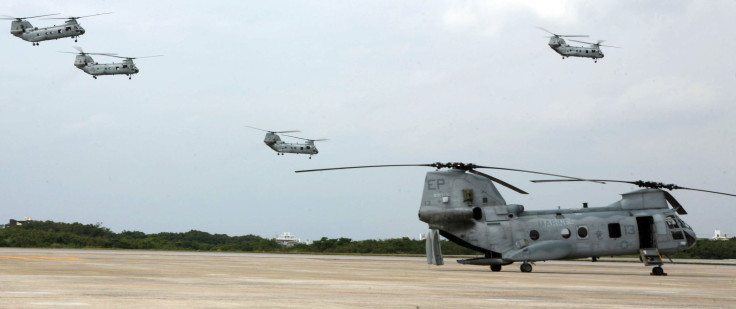Okinawa Governor Approves Relocation of Futenma US Military Base; Washington Welcomes The Deal As A Major Diplomatic Breakthrough

The controversial U.S. military air base on Japan’s southern prefecture of Okinawa will be relocated, after Governor Hirokazu Nakaima on Friday signed a document to sanction moving the U.S. base off the coast of Henoko, in a deal that was hailed by Washington as a major diplomatic breakthrough.
The agreement comes after years of negotiations between the U.S. and Japan over the location of the base, and amid fierce protests from locals demanding that the facility be moved out of the prefecture. The U.S. Marine Corps Air Station Futenma is currently located in Ginowan, a densely populated city in Okinawa, and local authorities have been demanding the closure or relocation of the facility, following residents’ complaints of crime, pollution and noise associated with the base.
"The office received the document at 10:50 am," an official from Okinawa's local branch of the defense ministry told Agence France-Presse, confirming the approval of the deal. "It was approved."
According to local media reports, Nakaima, who had originally opposed the deal, agreed to the new proposal after meeting with Prime Minister Shinzo Abe on Friday morning. Abe reportedly assured increased annual funding of up to $2.86 billion for Okinawa’s economy until 2021, in return for allowing the relocation of the Futenma base within the region. The base's relocation from Okinawa was part of Nakaima’s election campaign promise.
“I’m grateful for the surprisingly good proposals made by the prime minister.” Nakaima said after the meeting, RT News reported.
U.S. officials in Washington called the deal a major breakthrough as the approval comes after years of diplomatic deadlock and the deal is expected to help the U.S. strengthen its presence in the region to counter the increasing Chinese presence in the region.
The relocation of the base was stalled for more than 17 years after the proposal faced stiff resistance from local residents, who questioned the construction of a military base in a densely populated city center. And alleged crimes involving U.S. servicemen and disruptions caused by military planes and land use, had fueled local opposition against the base, which hosts half of the 40,000-plus U.S. soldiers and officers in Japan.
Last year, two U.S. Navy sailors were convicted of raping and robbing a Japanese woman in Okinawa while on duty. In 1995, the kidnap and brutal rape of a 12-year-old Okinawan schoolgirl by three Americans, triggered massive protests against U.S. military presence in the prefecture, and led to an agreement between the U.S. and Japan in 1996 to close the Futenma base within five to seven years.
Now, after the latest deal, Japan and the U.S. are negotiating terms of the planned relocation, with Japan seeking entry to the U.S. base for environmental and other official checks. Other plans include advancing the return of land occupied by the Futenma base back to Japan, currently scheduled for 2022, the Japan Daily Press reported.
The estimated cost of the base's relocation to its new site on reclaimed land is about $8.6 billion, and Japan will cover $3.1 billion of that sum. Japan's government had submitted the application to reclaim approximately 160 hectares of land off the coast of Henoko in March to relocate the air station. And, about 21 million cubic meters of dirt and sand, which will be transported from 15 locations in seven prefectures in the nation, will be used for the landfill for the new base, and the project is expected to take five years, The Asahi Shimbun News reported.
“Reaching this milestone is a clear demonstration to the region that the alliance is capable of handling complex, difficult problems in order to deal effectively with 21st century security challenges,” Chuck Hagel, U.S. defense secretary, said in a statement, the Washington Post reported.
© Copyright IBTimes 2025. All rights reserved.






















